Employability Skills Report: Orchardville Society Analysis
VerifiedAdded on 2023/03/16
|12
|3185
|60
Report
AI Summary
This report delves into the critical aspects of employability skills, focusing on their application within the health and social care sector, specifically referencing the Orchardville Society. The report examines the setting of responsibilities and performance objectives for managers, emphasizing personality traits, relationship management, decision-making, and adherence to employment legislation and ethical standards. It then assesses the effectiveness of these objectives through self-evaluation, feedback, and identification of strengths and weaknesses, making recommendations for improvement. Furthermore, the report analyzes motivational techniques, including self-improvement, reward systems, and portfolio development, alongside the application of 360-degree evaluation and relevant management theories. Finally, it explores effective time management strategies, such as prioritizing activities, setting objectives, and estimating task completion times to enhance overall workplace efficiency. This comprehensive analysis provides valuable insights into enhancing performance and productivity within the health and social care environment.
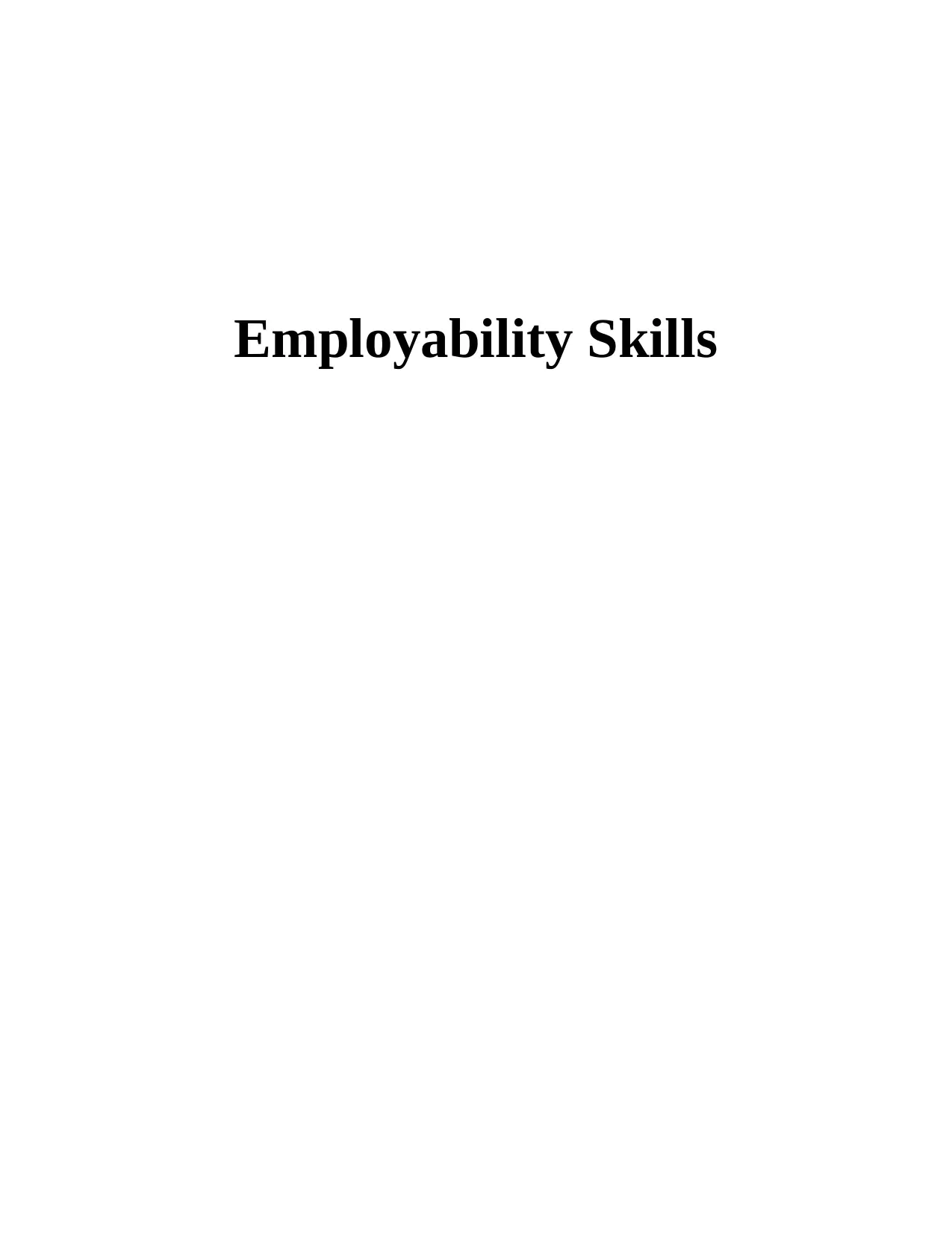
Employability Skills
Paraphrase This Document
Need a fresh take? Get an instant paraphrase of this document with our AI Paraphraser
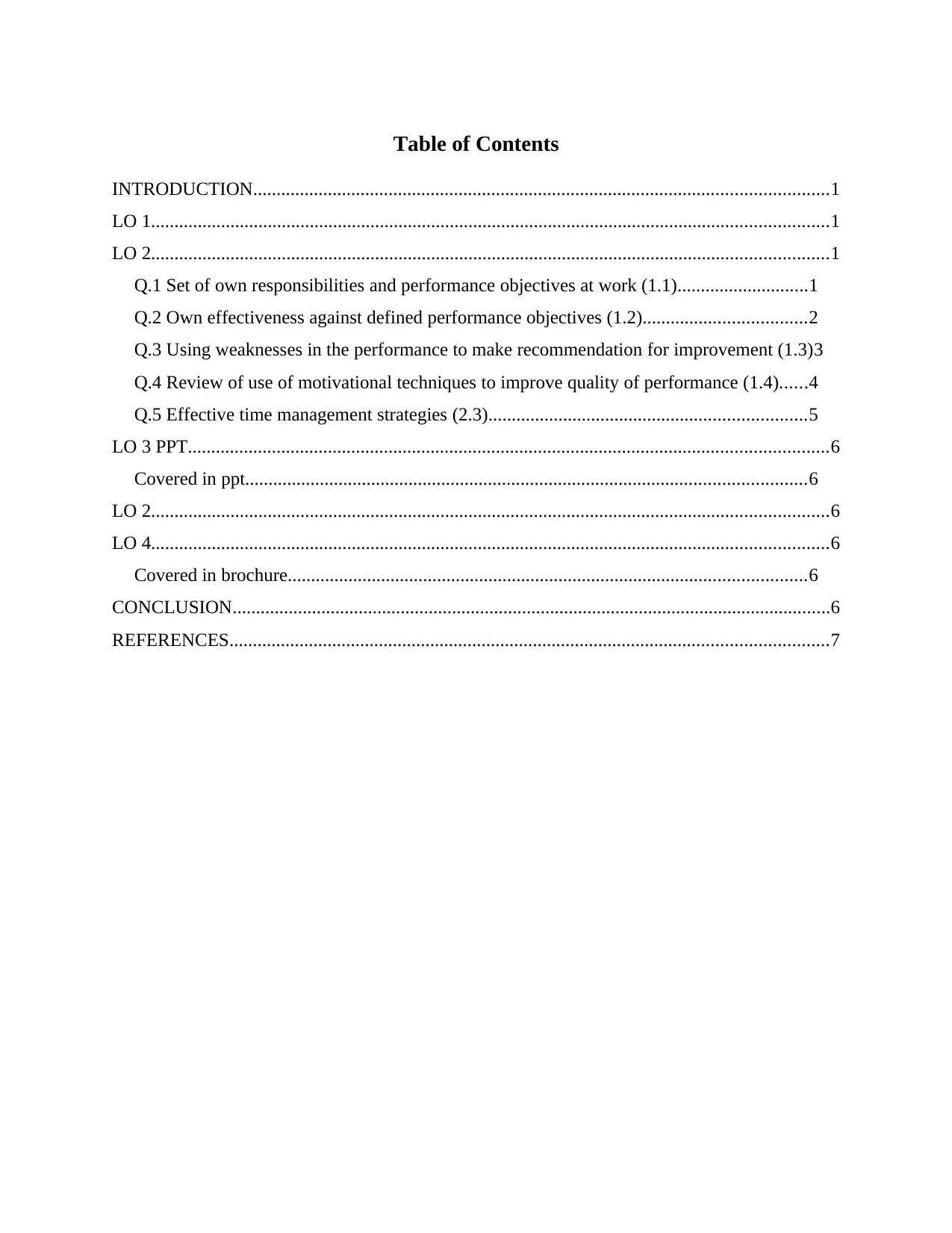
Table of Contents
INTRODUCTION...........................................................................................................................1
LO 1.................................................................................................................................................1
LO 2.................................................................................................................................................1
Q.1 Set of own responsibilities and performance objectives at work (1.1)............................1
Q.2 Own effectiveness against defined performance objectives (1.2)...................................2
Q.3 Using weaknesses in the performance to make recommendation for improvement (1.3)3
Q.4 Review of use of motivational techniques to improve quality of performance (1.4)......4
Q.5 Effective time management strategies (2.3)....................................................................5
LO 3 PPT.........................................................................................................................................6
Covered in ppt........................................................................................................................6
LO 2.................................................................................................................................................6
LO 4.................................................................................................................................................6
Covered in brochure...............................................................................................................6
CONCLUSION................................................................................................................................6
REFERENCES................................................................................................................................7
INTRODUCTION...........................................................................................................................1
LO 1.................................................................................................................................................1
LO 2.................................................................................................................................................1
Q.1 Set of own responsibilities and performance objectives at work (1.1)............................1
Q.2 Own effectiveness against defined performance objectives (1.2)...................................2
Q.3 Using weaknesses in the performance to make recommendation for improvement (1.3)3
Q.4 Review of use of motivational techniques to improve quality of performance (1.4)......4
Q.5 Effective time management strategies (2.3)....................................................................5
LO 3 PPT.........................................................................................................................................6
Covered in ppt........................................................................................................................6
LO 2.................................................................................................................................................6
LO 4.................................................................................................................................................6
Covered in brochure...............................................................................................................6
CONCLUSION................................................................................................................................6
REFERENCES................................................................................................................................7

⊘ This is a preview!⊘
Do you want full access?
Subscribe today to unlock all pages.

Trusted by 1+ million students worldwide
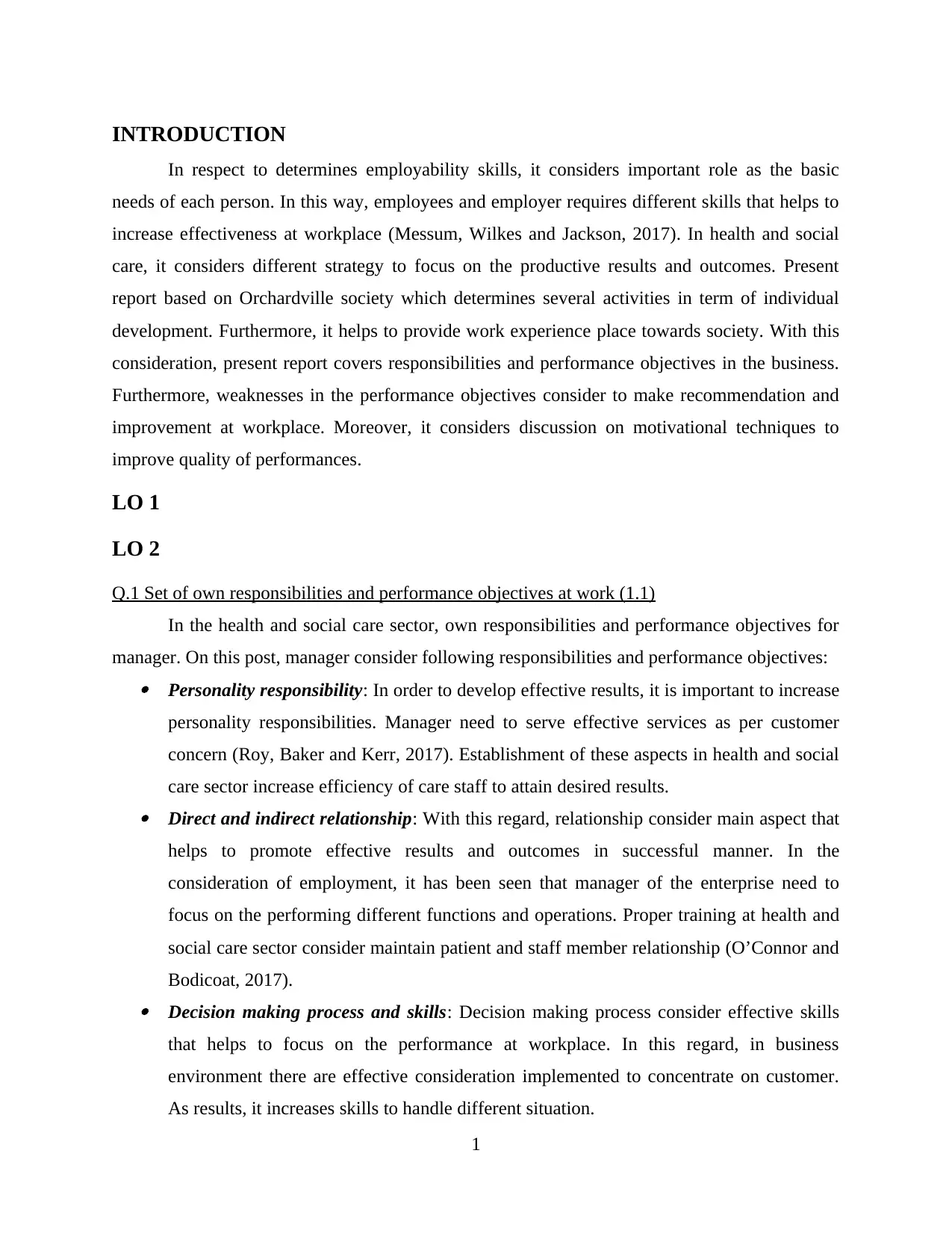
INTRODUCTION
In respect to determines employability skills, it considers important role as the basic
needs of each person. In this way, employees and employer requires different skills that helps to
increase effectiveness at workplace (Messum, Wilkes and Jackson, 2017). In health and social
care, it considers different strategy to focus on the productive results and outcomes. Present
report based on Orchardville society which determines several activities in term of individual
development. Furthermore, it helps to provide work experience place towards society. With this
consideration, present report covers responsibilities and performance objectives in the business.
Furthermore, weaknesses in the performance objectives consider to make recommendation and
improvement at workplace. Moreover, it considers discussion on motivational techniques to
improve quality of performances.
LO 1
LO 2
Q.1 Set of own responsibilities and performance objectives at work (1.1)
In the health and social care sector, own responsibilities and performance objectives for
manager. On this post, manager consider following responsibilities and performance objectives: Personality responsibility: In order to develop effective results, it is important to increase
personality responsibilities. Manager need to serve effective services as per customer
concern (Roy, Baker and Kerr, 2017). Establishment of these aspects in health and social
care sector increase efficiency of care staff to attain desired results. Direct and indirect relationship: With this regard, relationship consider main aspect that
helps to promote effective results and outcomes in successful manner. In the
consideration of employment, it has been seen that manager of the enterprise need to
focus on the performing different functions and operations. Proper training at health and
social care sector consider maintain patient and staff member relationship (O’Connor and
Bodicoat, 2017). Decision making process and skills: Decision making process consider effective skills
that helps to focus on the performance at workplace. In this regard, in business
environment there are effective consideration implemented to concentrate on customer.
As results, it increases skills to handle different situation.
1
In respect to determines employability skills, it considers important role as the basic
needs of each person. In this way, employees and employer requires different skills that helps to
increase effectiveness at workplace (Messum, Wilkes and Jackson, 2017). In health and social
care, it considers different strategy to focus on the productive results and outcomes. Present
report based on Orchardville society which determines several activities in term of individual
development. Furthermore, it helps to provide work experience place towards society. With this
consideration, present report covers responsibilities and performance objectives in the business.
Furthermore, weaknesses in the performance objectives consider to make recommendation and
improvement at workplace. Moreover, it considers discussion on motivational techniques to
improve quality of performances.
LO 1
LO 2
Q.1 Set of own responsibilities and performance objectives at work (1.1)
In the health and social care sector, own responsibilities and performance objectives for
manager. On this post, manager consider following responsibilities and performance objectives: Personality responsibility: In order to develop effective results, it is important to increase
personality responsibilities. Manager need to serve effective services as per customer
concern (Roy, Baker and Kerr, 2017). Establishment of these aspects in health and social
care sector increase efficiency of care staff to attain desired results. Direct and indirect relationship: With this regard, relationship consider main aspect that
helps to promote effective results and outcomes in successful manner. In the
consideration of employment, it has been seen that manager of the enterprise need to
focus on the performing different functions and operations. Proper training at health and
social care sector consider maintain patient and staff member relationship (O’Connor and
Bodicoat, 2017). Decision making process and skills: Decision making process consider effective skills
that helps to focus on the performance at workplace. In this regard, in business
environment there are effective consideration implemented to concentrate on customer.
As results, it increases skills to handle different situation.
1
Paraphrase This Document
Need a fresh take? Get an instant paraphrase of this document with our AI Paraphraser
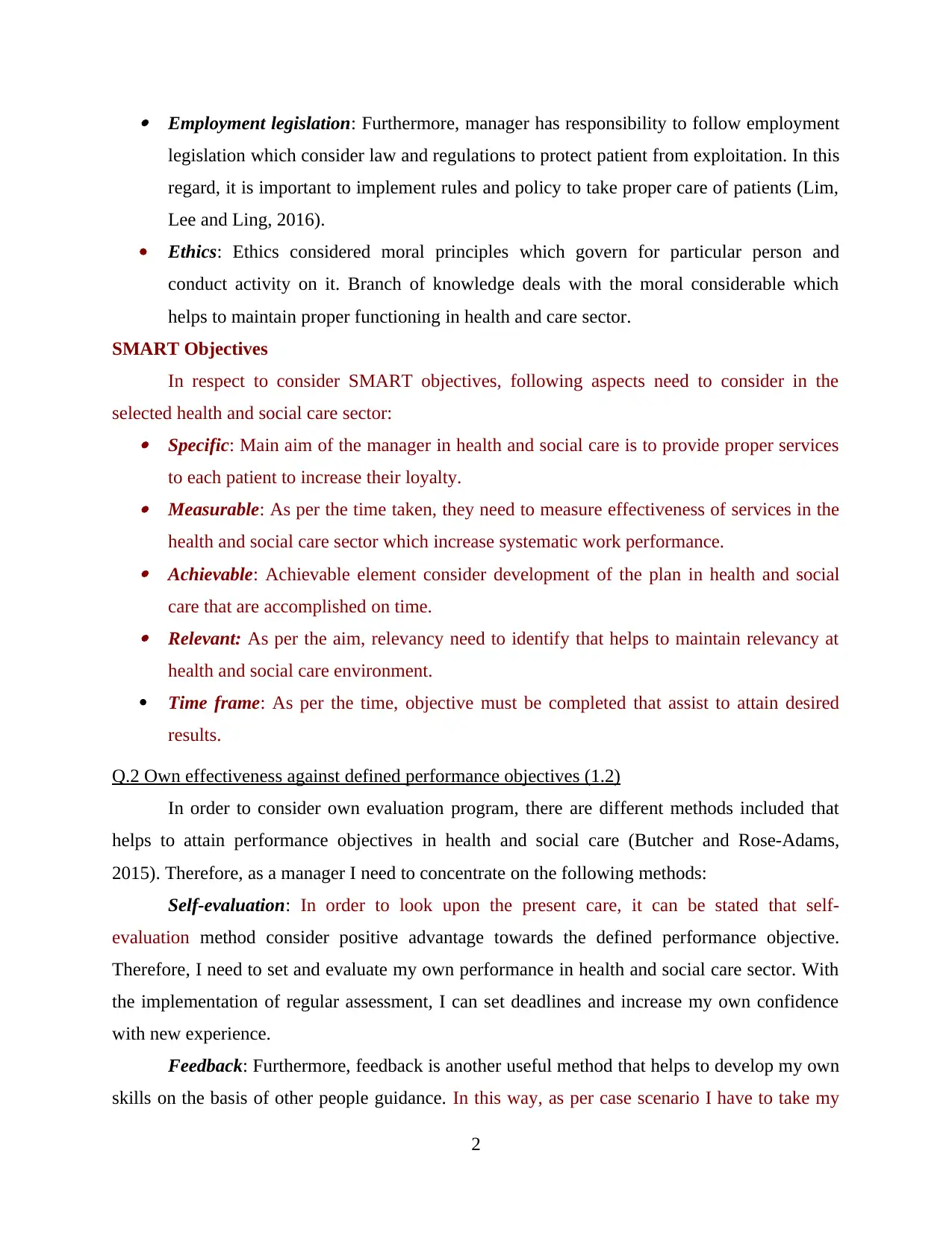
Employment legislation: Furthermore, manager has responsibility to follow employment
legislation which consider law and regulations to protect patient from exploitation. In this
regard, it is important to implement rules and policy to take proper care of patients (Lim,
Lee and Ling, 2016).
Ethics: Ethics considered moral principles which govern for particular person and
conduct activity on it. Branch of knowledge deals with the moral considerable which
helps to maintain proper functioning in health and care sector.
SMART Objectives
In respect to consider SMART objectives, following aspects need to consider in the
selected health and social care sector: Specific: Main aim of the manager in health and social care is to provide proper services
to each patient to increase their loyalty. Measurable: As per the time taken, they need to measure effectiveness of services in the
health and social care sector which increase systematic work performance. Achievable: Achievable element consider development of the plan in health and social
care that are accomplished on time. Relevant: As per the aim, relevancy need to identify that helps to maintain relevancy at
health and social care environment.
Time frame: As per the time, objective must be completed that assist to attain desired
results.
Q.2 Own effectiveness against defined performance objectives (1.2)
In order to consider own evaluation program, there are different methods included that
helps to attain performance objectives in health and social care (Butcher and Rose-Adams,
2015). Therefore, as a manager I need to concentrate on the following methods:
Self-evaluation: In order to look upon the present care, it can be stated that self-
evaluation method consider positive advantage towards the defined performance objective.
Therefore, I need to set and evaluate my own performance in health and social care sector. With
the implementation of regular assessment, I can set deadlines and increase my own confidence
with new experience.
Feedback: Furthermore, feedback is another useful method that helps to develop my own
skills on the basis of other people guidance. In this way, as per case scenario I have to take my
2
legislation which consider law and regulations to protect patient from exploitation. In this
regard, it is important to implement rules and policy to take proper care of patients (Lim,
Lee and Ling, 2016).
Ethics: Ethics considered moral principles which govern for particular person and
conduct activity on it. Branch of knowledge deals with the moral considerable which
helps to maintain proper functioning in health and care sector.
SMART Objectives
In respect to consider SMART objectives, following aspects need to consider in the
selected health and social care sector: Specific: Main aim of the manager in health and social care is to provide proper services
to each patient to increase their loyalty. Measurable: As per the time taken, they need to measure effectiveness of services in the
health and social care sector which increase systematic work performance. Achievable: Achievable element consider development of the plan in health and social
care that are accomplished on time. Relevant: As per the aim, relevancy need to identify that helps to maintain relevancy at
health and social care environment.
Time frame: As per the time, objective must be completed that assist to attain desired
results.
Q.2 Own effectiveness against defined performance objectives (1.2)
In order to consider own evaluation program, there are different methods included that
helps to attain performance objectives in health and social care (Butcher and Rose-Adams,
2015). Therefore, as a manager I need to concentrate on the following methods:
Self-evaluation: In order to look upon the present care, it can be stated that self-
evaluation method consider positive advantage towards the defined performance objective.
Therefore, I need to set and evaluate my own performance in health and social care sector. With
the implementation of regular assessment, I can set deadlines and increase my own confidence
with new experience.
Feedback: Furthermore, feedback is another useful method that helps to develop my own
skills on the basis of other people guidance. In this way, as per case scenario I have to take my
2
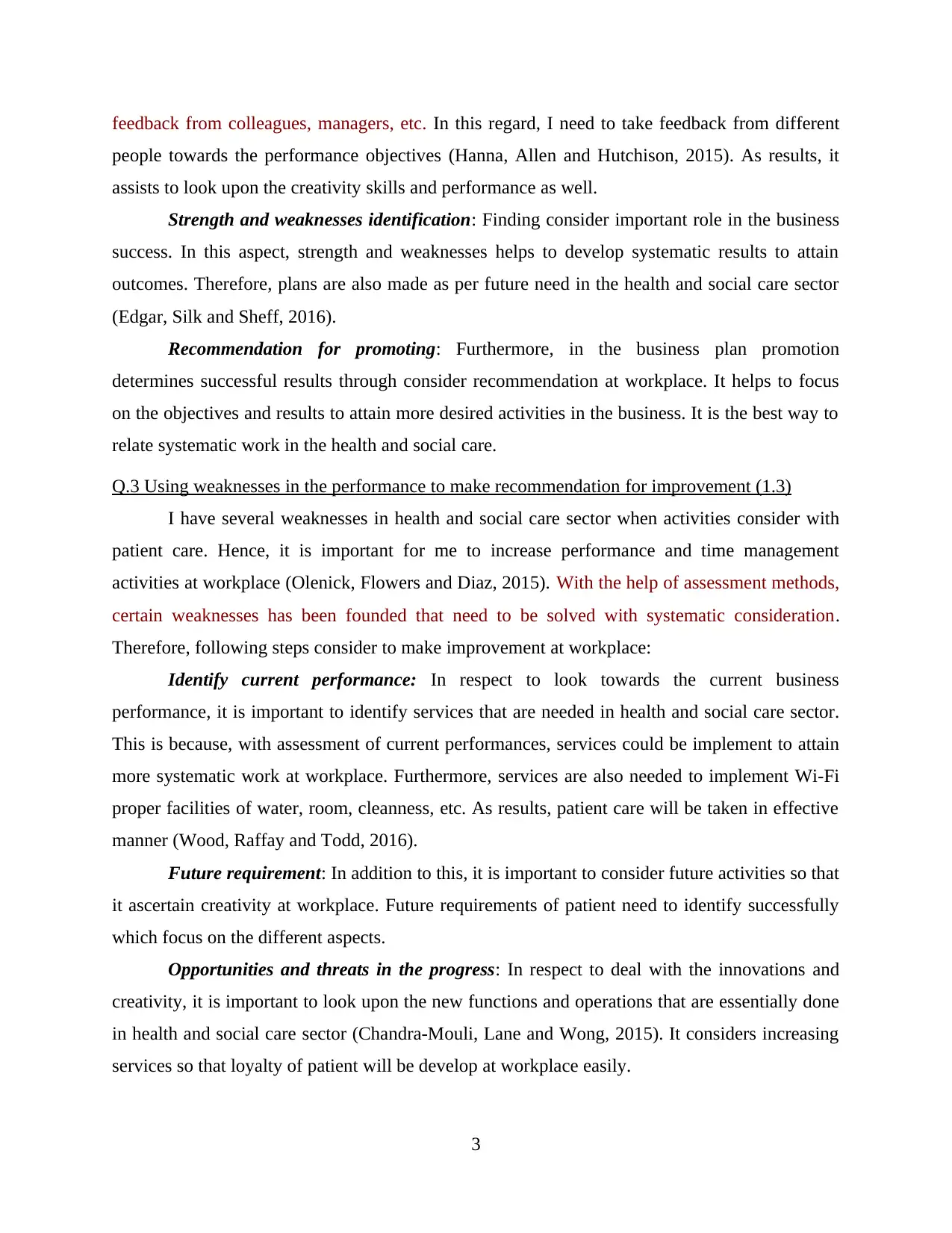
feedback from colleagues, managers, etc. In this regard, I need to take feedback from different
people towards the performance objectives (Hanna, Allen and Hutchison, 2015). As results, it
assists to look upon the creativity skills and performance as well.
Strength and weaknesses identification: Finding consider important role in the business
success. In this aspect, strength and weaknesses helps to develop systematic results to attain
outcomes. Therefore, plans are also made as per future need in the health and social care sector
(Edgar, Silk and Sheff, 2016).
Recommendation for promoting: Furthermore, in the business plan promotion
determines successful results through consider recommendation at workplace. It helps to focus
on the objectives and results to attain more desired activities in the business. It is the best way to
relate systematic work in the health and social care.
Q.3 Using weaknesses in the performance to make recommendation for improvement (1.3)
I have several weaknesses in health and social care sector when activities consider with
patient care. Hence, it is important for me to increase performance and time management
activities at workplace (Olenick, Flowers and Diaz, 2015). With the help of assessment methods,
certain weaknesses has been founded that need to be solved with systematic consideration.
Therefore, following steps consider to make improvement at workplace:
Identify current performance: In respect to look towards the current business
performance, it is important to identify services that are needed in health and social care sector.
This is because, with assessment of current performances, services could be implement to attain
more systematic work at workplace. Furthermore, services are also needed to implement Wi-Fi
proper facilities of water, room, cleanness, etc. As results, patient care will be taken in effective
manner (Wood, Raffay and Todd, 2016).
Future requirement: In addition to this, it is important to consider future activities so that
it ascertain creativity at workplace. Future requirements of patient need to identify successfully
which focus on the different aspects.
Opportunities and threats in the progress: In respect to deal with the innovations and
creativity, it is important to look upon the new functions and operations that are essentially done
in health and social care sector (Chandra-Mouli, Lane and Wong, 2015). It considers increasing
services so that loyalty of patient will be develop at workplace easily.
3
people towards the performance objectives (Hanna, Allen and Hutchison, 2015). As results, it
assists to look upon the creativity skills and performance as well.
Strength and weaknesses identification: Finding consider important role in the business
success. In this aspect, strength and weaknesses helps to develop systematic results to attain
outcomes. Therefore, plans are also made as per future need in the health and social care sector
(Edgar, Silk and Sheff, 2016).
Recommendation for promoting: Furthermore, in the business plan promotion
determines successful results through consider recommendation at workplace. It helps to focus
on the objectives and results to attain more desired activities in the business. It is the best way to
relate systematic work in the health and social care.
Q.3 Using weaknesses in the performance to make recommendation for improvement (1.3)
I have several weaknesses in health and social care sector when activities consider with
patient care. Hence, it is important for me to increase performance and time management
activities at workplace (Olenick, Flowers and Diaz, 2015). With the help of assessment methods,
certain weaknesses has been founded that need to be solved with systematic consideration.
Therefore, following steps consider to make improvement at workplace:
Identify current performance: In respect to look towards the current business
performance, it is important to identify services that are needed in health and social care sector.
This is because, with assessment of current performances, services could be implement to attain
more systematic work at workplace. Furthermore, services are also needed to implement Wi-Fi
proper facilities of water, room, cleanness, etc. As results, patient care will be taken in effective
manner (Wood, Raffay and Todd, 2016).
Future requirement: In addition to this, it is important to consider future activities so that
it ascertain creativity at workplace. Future requirements of patient need to identify successfully
which focus on the different aspects.
Opportunities and threats in the progress: In respect to deal with the innovations and
creativity, it is important to look upon the new functions and operations that are essentially done
in health and social care sector (Chandra-Mouli, Lane and Wong, 2015). It considers increasing
services so that loyalty of patient will be develop at workplace easily.
3
⊘ This is a preview!⊘
Do you want full access?
Subscribe today to unlock all pages.

Trusted by 1+ million students worldwide
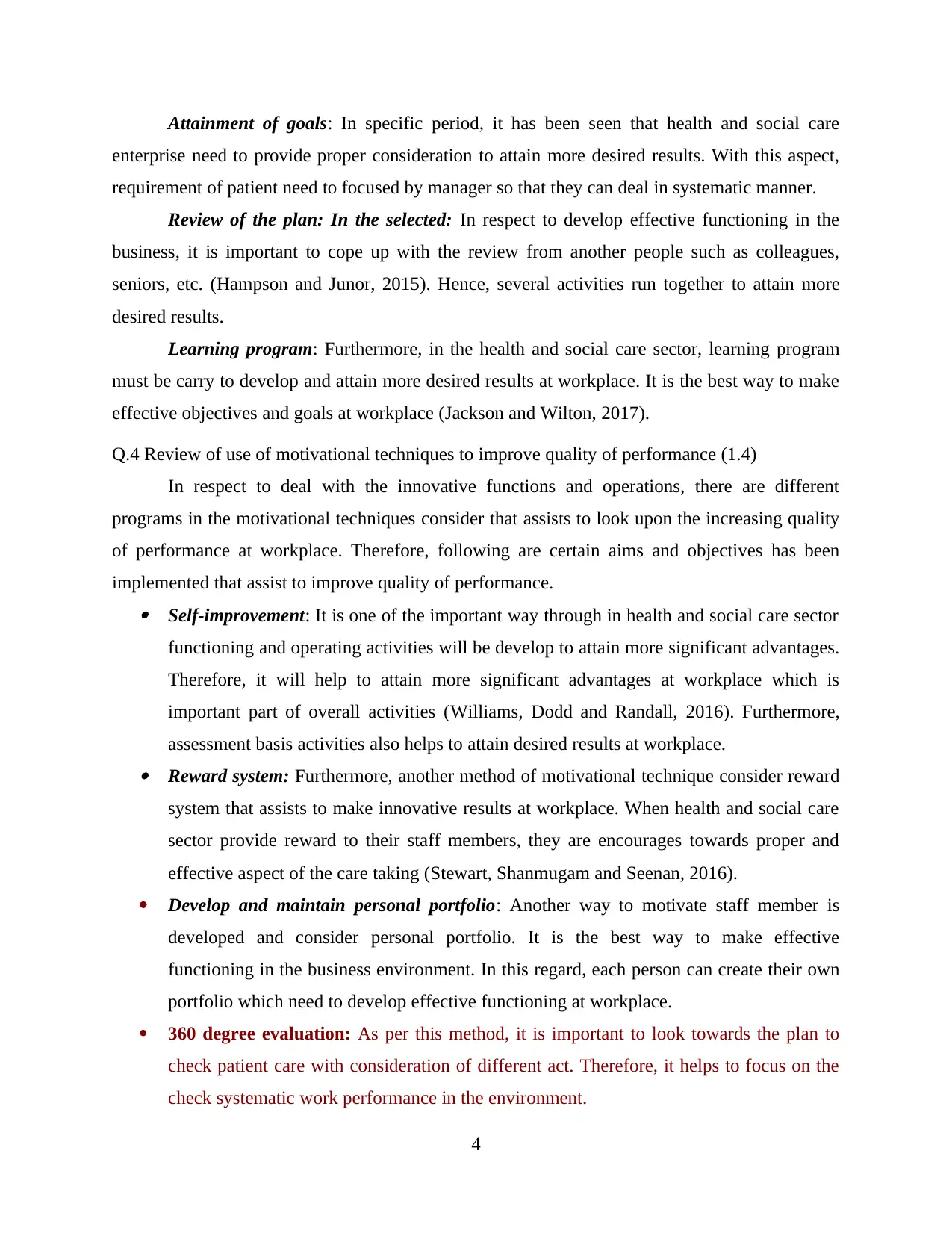
Attainment of goals: In specific period, it has been seen that health and social care
enterprise need to provide proper consideration to attain more desired results. With this aspect,
requirement of patient need to focused by manager so that they can deal in systematic manner.
Review of the plan: In the selected: In respect to develop effective functioning in the
business, it is important to cope up with the review from another people such as colleagues,
seniors, etc. (Hampson and Junor, 2015). Hence, several activities run together to attain more
desired results.
Learning program: Furthermore, in the health and social care sector, learning program
must be carry to develop and attain more desired results at workplace. It is the best way to make
effective objectives and goals at workplace (Jackson and Wilton, 2017).
Q.4 Review of use of motivational techniques to improve quality of performance (1.4)
In respect to deal with the innovative functions and operations, there are different
programs in the motivational techniques consider that assists to look upon the increasing quality
of performance at workplace. Therefore, following are certain aims and objectives has been
implemented that assist to improve quality of performance. Self-improvement: It is one of the important way through in health and social care sector
functioning and operating activities will be develop to attain more significant advantages.
Therefore, it will help to attain more significant advantages at workplace which is
important part of overall activities (Williams, Dodd and Randall, 2016). Furthermore,
assessment basis activities also helps to attain desired results at workplace. Reward system: Furthermore, another method of motivational technique consider reward
system that assists to make innovative results at workplace. When health and social care
sector provide reward to their staff members, they are encourages towards proper and
effective aspect of the care taking (Stewart, Shanmugam and Seenan, 2016).
Develop and maintain personal portfolio: Another way to motivate staff member is
developed and consider personal portfolio. It is the best way to make effective
functioning in the business environment. In this regard, each person can create their own
portfolio which need to develop effective functioning at workplace.
360 degree evaluation: As per this method, it is important to look towards the plan to
check patient care with consideration of different act. Therefore, it helps to focus on the
check systematic work performance in the environment.
4
enterprise need to provide proper consideration to attain more desired results. With this aspect,
requirement of patient need to focused by manager so that they can deal in systematic manner.
Review of the plan: In the selected: In respect to develop effective functioning in the
business, it is important to cope up with the review from another people such as colleagues,
seniors, etc. (Hampson and Junor, 2015). Hence, several activities run together to attain more
desired results.
Learning program: Furthermore, in the health and social care sector, learning program
must be carry to develop and attain more desired results at workplace. It is the best way to make
effective objectives and goals at workplace (Jackson and Wilton, 2017).
Q.4 Review of use of motivational techniques to improve quality of performance (1.4)
In respect to deal with the innovative functions and operations, there are different
programs in the motivational techniques consider that assists to look upon the increasing quality
of performance at workplace. Therefore, following are certain aims and objectives has been
implemented that assist to improve quality of performance. Self-improvement: It is one of the important way through in health and social care sector
functioning and operating activities will be develop to attain more significant advantages.
Therefore, it will help to attain more significant advantages at workplace which is
important part of overall activities (Williams, Dodd and Randall, 2016). Furthermore,
assessment basis activities also helps to attain desired results at workplace. Reward system: Furthermore, another method of motivational technique consider reward
system that assists to make innovative results at workplace. When health and social care
sector provide reward to their staff members, they are encourages towards proper and
effective aspect of the care taking (Stewart, Shanmugam and Seenan, 2016).
Develop and maintain personal portfolio: Another way to motivate staff member is
developed and consider personal portfolio. It is the best way to make effective
functioning in the business environment. In this regard, each person can create their own
portfolio which need to develop effective functioning at workplace.
360 degree evaluation: As per this method, it is important to look towards the plan to
check patient care with consideration of different act. Therefore, it helps to focus on the
check systematic work performance in the environment.
4
Paraphrase This Document
Need a fresh take? Get an instant paraphrase of this document with our AI Paraphraser
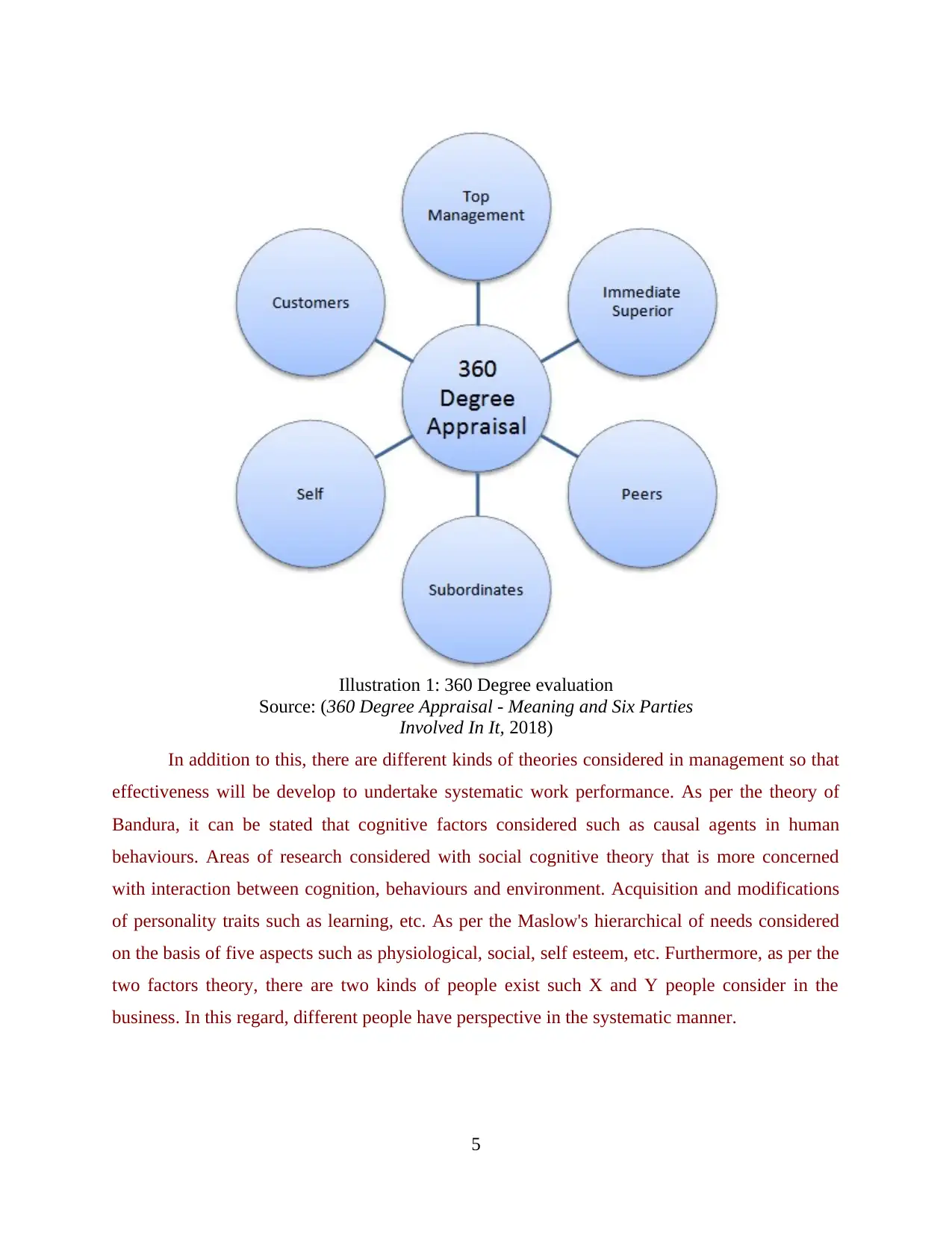
In addition to this, there are different kinds of theories considered in management so that
effectiveness will be develop to undertake systematic work performance. As per the theory of
Bandura, it can be stated that cognitive factors considered such as causal agents in human
behaviours. Areas of research considered with social cognitive theory that is more concerned
with interaction between cognition, behaviours and environment. Acquisition and modifications
of personality traits such as learning, etc. As per the Maslow's hierarchical of needs considered
on the basis of five aspects such as physiological, social, self esteem, etc. Furthermore, as per the
two factors theory, there are two kinds of people exist such X and Y people consider in the
business. In this regard, different people have perspective in the systematic manner.
5
Illustration 1: 360 Degree evaluation
Source: (360 Degree Appraisal - Meaning and Six Parties
Involved In It, 2018)
effectiveness will be develop to undertake systematic work performance. As per the theory of
Bandura, it can be stated that cognitive factors considered such as causal agents in human
behaviours. Areas of research considered with social cognitive theory that is more concerned
with interaction between cognition, behaviours and environment. Acquisition and modifications
of personality traits such as learning, etc. As per the Maslow's hierarchical of needs considered
on the basis of five aspects such as physiological, social, self esteem, etc. Furthermore, as per the
two factors theory, there are two kinds of people exist such X and Y people consider in the
business. In this regard, different people have perspective in the systematic manner.
5
Illustration 1: 360 Degree evaluation
Source: (360 Degree Appraisal - Meaning and Six Parties
Involved In It, 2018)
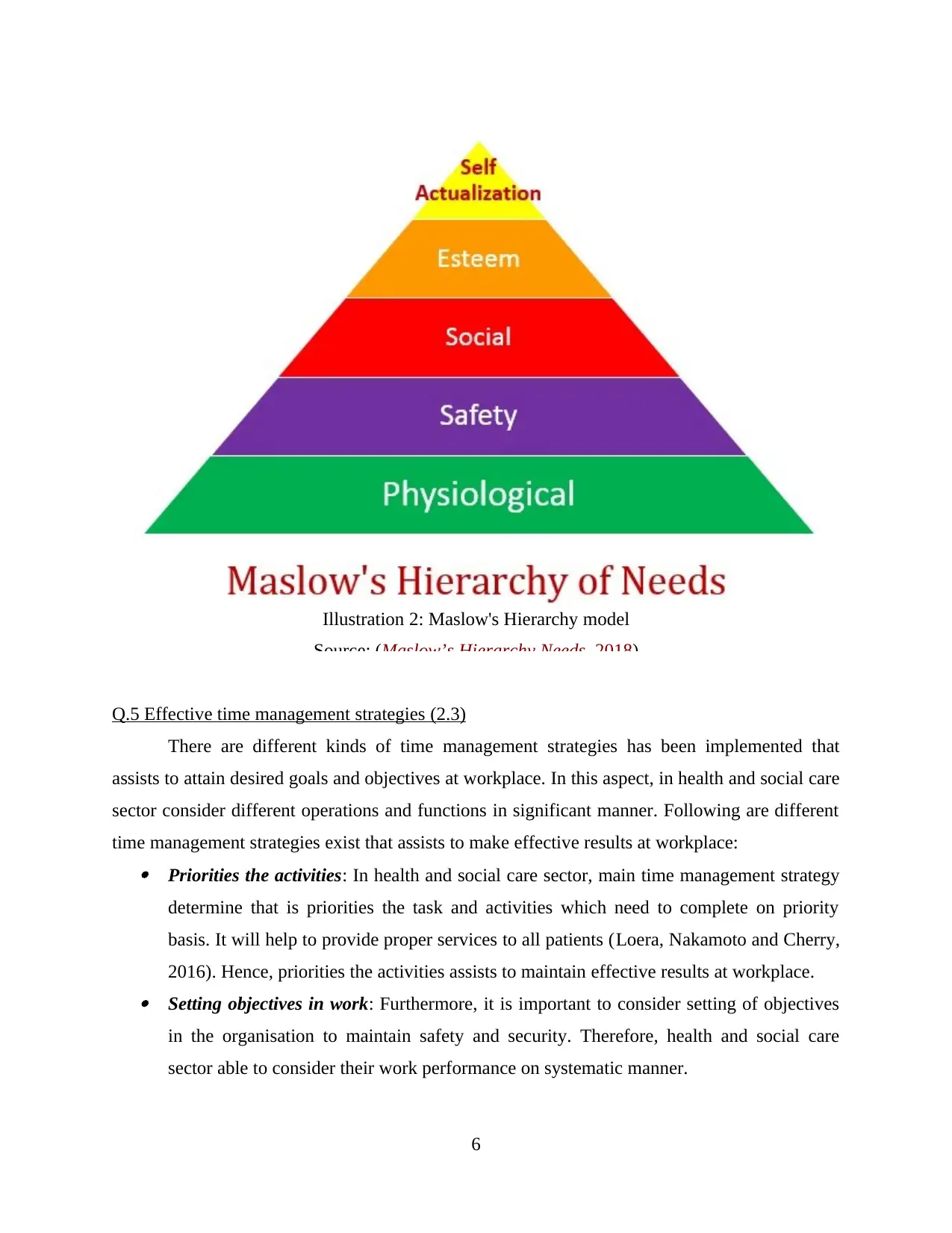
Q.5 Effective time management strategies (2.3)
There are different kinds of time management strategies has been implemented that
assists to attain desired goals and objectives at workplace. In this aspect, in health and social care
sector consider different operations and functions in significant manner. Following are different
time management strategies exist that assists to make effective results at workplace: Priorities the activities: In health and social care sector, main time management strategy
determine that is priorities the task and activities which need to complete on priority
basis. It will help to provide proper services to all patients (Loera, Nakamoto and Cherry,
2016). Hence, priorities the activities assists to maintain effective results at workplace. Setting objectives in work: Furthermore, it is important to consider setting of objectives
in the organisation to maintain safety and security. Therefore, health and social care
sector able to consider their work performance on systematic manner.
6
Illustration 2: Maslow's Hierarchy model
Source: (Maslow’s Hierarchy Needs, 2018)
There are different kinds of time management strategies has been implemented that
assists to attain desired goals and objectives at workplace. In this aspect, in health and social care
sector consider different operations and functions in significant manner. Following are different
time management strategies exist that assists to make effective results at workplace: Priorities the activities: In health and social care sector, main time management strategy
determine that is priorities the task and activities which need to complete on priority
basis. It will help to provide proper services to all patients (Loera, Nakamoto and Cherry,
2016). Hence, priorities the activities assists to maintain effective results at workplace. Setting objectives in work: Furthermore, it is important to consider setting of objectives
in the organisation to maintain safety and security. Therefore, health and social care
sector able to consider their work performance on systematic manner.
6
Illustration 2: Maslow's Hierarchy model
Source: (Maslow’s Hierarchy Needs, 2018)
⊘ This is a preview!⊘
Do you want full access?
Subscribe today to unlock all pages.

Trusted by 1+ million students worldwide
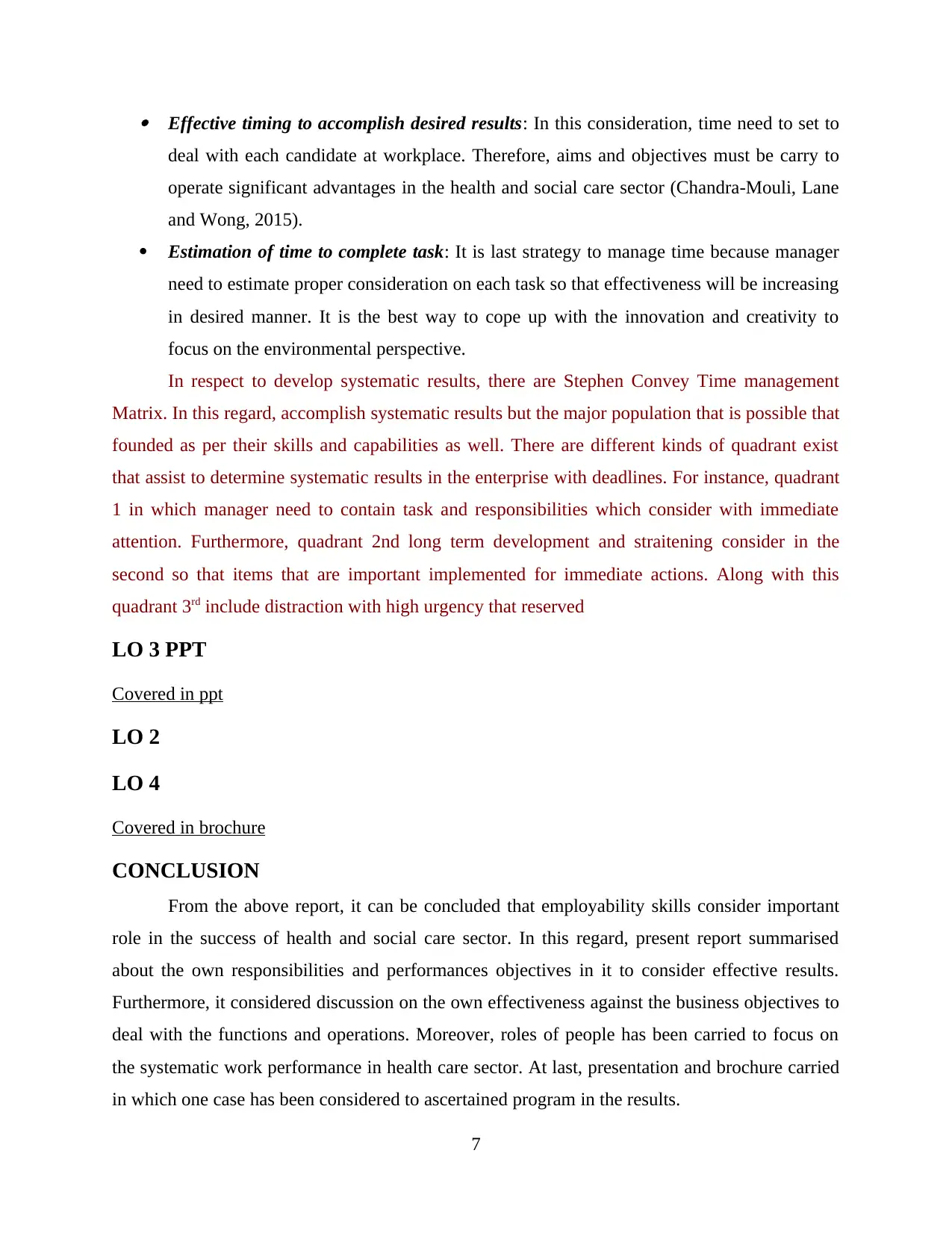
Effective timing to accomplish desired results: In this consideration, time need to set to
deal with each candidate at workplace. Therefore, aims and objectives must be carry to
operate significant advantages in the health and social care sector (Chandra-Mouli, Lane
and Wong, 2015).
Estimation of time to complete task: It is last strategy to manage time because manager
need to estimate proper consideration on each task so that effectiveness will be increasing
in desired manner. It is the best way to cope up with the innovation and creativity to
focus on the environmental perspective.
In respect to develop systematic results, there are Stephen Convey Time management
Matrix. In this regard, accomplish systematic results but the major population that is possible that
founded as per their skills and capabilities as well. There are different kinds of quadrant exist
that assist to determine systematic results in the enterprise with deadlines. For instance, quadrant
1 in which manager need to contain task and responsibilities which consider with immediate
attention. Furthermore, quadrant 2nd long term development and straitening consider in the
second so that items that are important implemented for immediate actions. Along with this
quadrant 3rd include distraction with high urgency that reserved
LO 3 PPT
Covered in ppt
LO 2
LO 4
Covered in brochure
CONCLUSION
From the above report, it can be concluded that employability skills consider important
role in the success of health and social care sector. In this regard, present report summarised
about the own responsibilities and performances objectives in it to consider effective results.
Furthermore, it considered discussion on the own effectiveness against the business objectives to
deal with the functions and operations. Moreover, roles of people has been carried to focus on
the systematic work performance in health care sector. At last, presentation and brochure carried
in which one case has been considered to ascertained program in the results.
7
deal with each candidate at workplace. Therefore, aims and objectives must be carry to
operate significant advantages in the health and social care sector (Chandra-Mouli, Lane
and Wong, 2015).
Estimation of time to complete task: It is last strategy to manage time because manager
need to estimate proper consideration on each task so that effectiveness will be increasing
in desired manner. It is the best way to cope up with the innovation and creativity to
focus on the environmental perspective.
In respect to develop systematic results, there are Stephen Convey Time management
Matrix. In this regard, accomplish systematic results but the major population that is possible that
founded as per their skills and capabilities as well. There are different kinds of quadrant exist
that assist to determine systematic results in the enterprise with deadlines. For instance, quadrant
1 in which manager need to contain task and responsibilities which consider with immediate
attention. Furthermore, quadrant 2nd long term development and straitening consider in the
second so that items that are important implemented for immediate actions. Along with this
quadrant 3rd include distraction with high urgency that reserved
LO 3 PPT
Covered in ppt
LO 2
LO 4
Covered in brochure
CONCLUSION
From the above report, it can be concluded that employability skills consider important
role in the success of health and social care sector. In this regard, present report summarised
about the own responsibilities and performances objectives in it to consider effective results.
Furthermore, it considered discussion on the own effectiveness against the business objectives to
deal with the functions and operations. Moreover, roles of people has been carried to focus on
the systematic work performance in health care sector. At last, presentation and brochure carried
in which one case has been considered to ascertained program in the results.
7
Paraphrase This Document
Need a fresh take? Get an instant paraphrase of this document with our AI Paraphraser
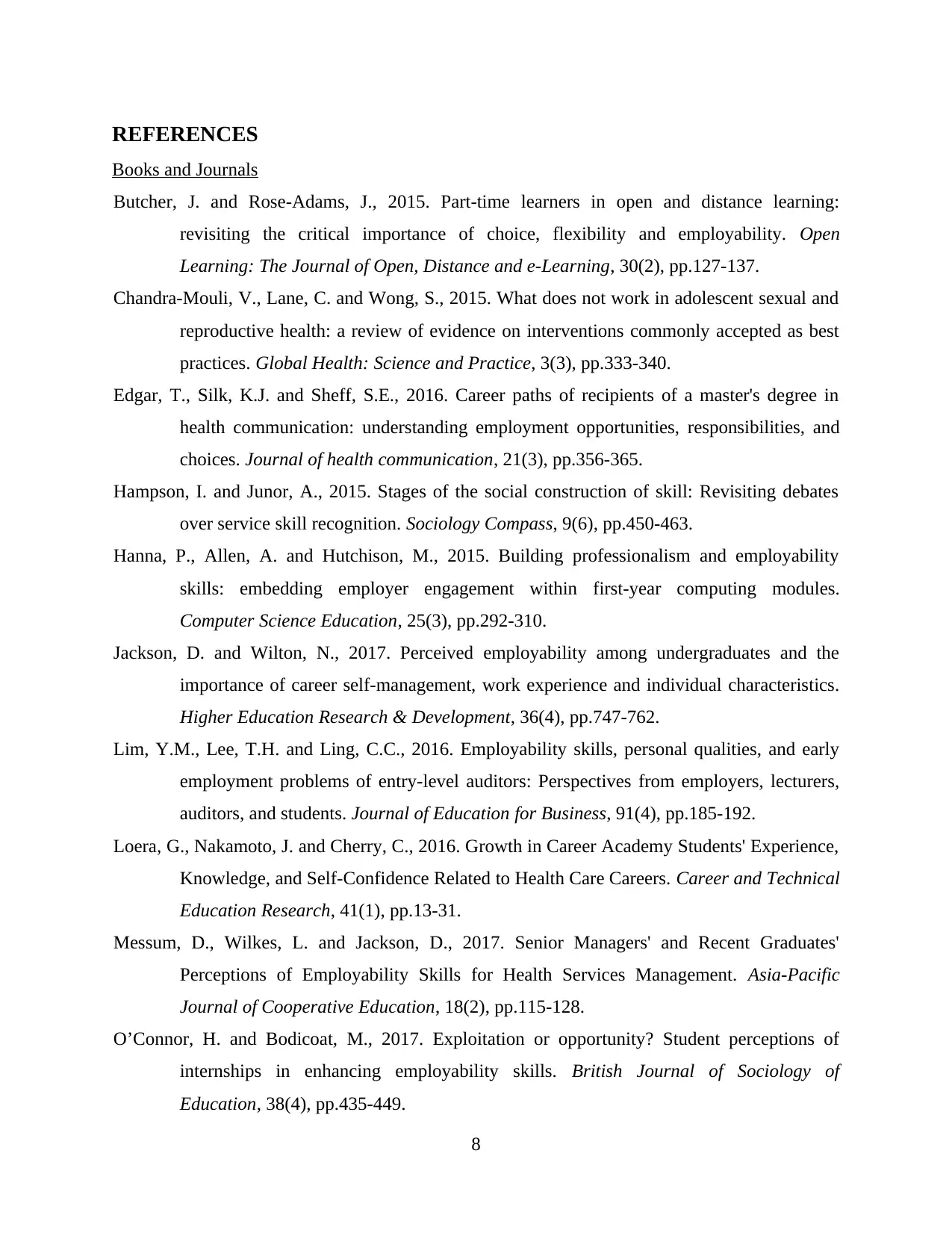
REFERENCES
Books and Journals
Butcher, J. and Rose-Adams, J., 2015. Part-time learners in open and distance learning:
revisiting the critical importance of choice, flexibility and employability. Open
Learning: The Journal of Open, Distance and e-Learning, 30(2), pp.127-137.
Chandra-Mouli, V., Lane, C. and Wong, S., 2015. What does not work in adolescent sexual and
reproductive health: a review of evidence on interventions commonly accepted as best
practices. Global Health: Science and Practice, 3(3), pp.333-340.
Edgar, T., Silk, K.J. and Sheff, S.E., 2016. Career paths of recipients of a master's degree in
health communication: understanding employment opportunities, responsibilities, and
choices. Journal of health communication, 21(3), pp.356-365.
Hampson, I. and Junor, A., 2015. Stages of the social construction of skill: Revisiting debates
over service skill recognition. Sociology Compass, 9(6), pp.450-463.
Hanna, P., Allen, A. and Hutchison, M., 2015. Building professionalism and employability
skills: embedding employer engagement within first-year computing modules.
Computer Science Education, 25(3), pp.292-310.
Jackson, D. and Wilton, N., 2017. Perceived employability among undergraduates and the
importance of career self-management, work experience and individual characteristics.
Higher Education Research & Development, 36(4), pp.747-762.
Lim, Y.M., Lee, T.H. and Ling, C.C., 2016. Employability skills, personal qualities, and early
employment problems of entry-level auditors: Perspectives from employers, lecturers,
auditors, and students. Journal of Education for Business, 91(4), pp.185-192.
Loera, G., Nakamoto, J. and Cherry, C., 2016. Growth in Career Academy Students' Experience,
Knowledge, and Self-Confidence Related to Health Care Careers. Career and Technical
Education Research, 41(1), pp.13-31.
Messum, D., Wilkes, L. and Jackson, D., 2017. Senior Managers' and Recent Graduates'
Perceptions of Employability Skills for Health Services Management. Asia-Pacific
Journal of Cooperative Education, 18(2), pp.115-128.
O’Connor, H. and Bodicoat, M., 2017. Exploitation or opportunity? Student perceptions of
internships in enhancing employability skills. British Journal of Sociology of
Education, 38(4), pp.435-449.
8
Books and Journals
Butcher, J. and Rose-Adams, J., 2015. Part-time learners in open and distance learning:
revisiting the critical importance of choice, flexibility and employability. Open
Learning: The Journal of Open, Distance and e-Learning, 30(2), pp.127-137.
Chandra-Mouli, V., Lane, C. and Wong, S., 2015. What does not work in adolescent sexual and
reproductive health: a review of evidence on interventions commonly accepted as best
practices. Global Health: Science and Practice, 3(3), pp.333-340.
Edgar, T., Silk, K.J. and Sheff, S.E., 2016. Career paths of recipients of a master's degree in
health communication: understanding employment opportunities, responsibilities, and
choices. Journal of health communication, 21(3), pp.356-365.
Hampson, I. and Junor, A., 2015. Stages of the social construction of skill: Revisiting debates
over service skill recognition. Sociology Compass, 9(6), pp.450-463.
Hanna, P., Allen, A. and Hutchison, M., 2015. Building professionalism and employability
skills: embedding employer engagement within first-year computing modules.
Computer Science Education, 25(3), pp.292-310.
Jackson, D. and Wilton, N., 2017. Perceived employability among undergraduates and the
importance of career self-management, work experience and individual characteristics.
Higher Education Research & Development, 36(4), pp.747-762.
Lim, Y.M., Lee, T.H. and Ling, C.C., 2016. Employability skills, personal qualities, and early
employment problems of entry-level auditors: Perspectives from employers, lecturers,
auditors, and students. Journal of Education for Business, 91(4), pp.185-192.
Loera, G., Nakamoto, J. and Cherry, C., 2016. Growth in Career Academy Students' Experience,
Knowledge, and Self-Confidence Related to Health Care Careers. Career and Technical
Education Research, 41(1), pp.13-31.
Messum, D., Wilkes, L. and Jackson, D., 2017. Senior Managers' and Recent Graduates'
Perceptions of Employability Skills for Health Services Management. Asia-Pacific
Journal of Cooperative Education, 18(2), pp.115-128.
O’Connor, H. and Bodicoat, M., 2017. Exploitation or opportunity? Student perceptions of
internships in enhancing employability skills. British Journal of Sociology of
Education, 38(4), pp.435-449.
8
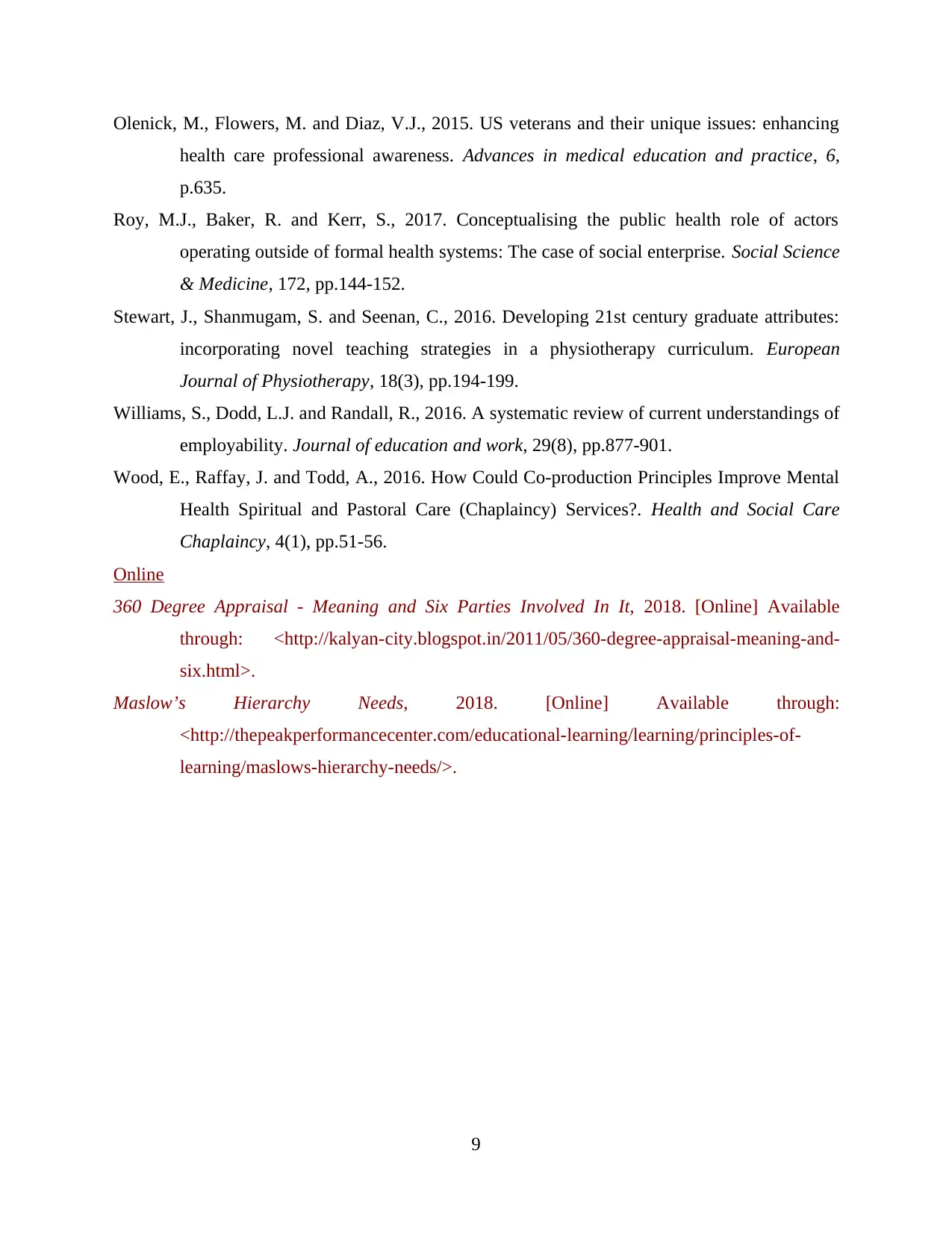
Olenick, M., Flowers, M. and Diaz, V.J., 2015. US veterans and their unique issues: enhancing
health care professional awareness. Advances in medical education and practice, 6,
p.635.
Roy, M.J., Baker, R. and Kerr, S., 2017. Conceptualising the public health role of actors
operating outside of formal health systems: The case of social enterprise. Social Science
& Medicine, 172, pp.144-152.
Stewart, J., Shanmugam, S. and Seenan, C., 2016. Developing 21st century graduate attributes:
incorporating novel teaching strategies in a physiotherapy curriculum. European
Journal of Physiotherapy, 18(3), pp.194-199.
Williams, S., Dodd, L.J. and Randall, R., 2016. A systematic review of current understandings of
employability. Journal of education and work, 29(8), pp.877-901.
Wood, E., Raffay, J. and Todd, A., 2016. How Could Co-production Principles Improve Mental
Health Spiritual and Pastoral Care (Chaplaincy) Services?. Health and Social Care
Chaplaincy, 4(1), pp.51-56.
Online
360 Degree Appraisal - Meaning and Six Parties Involved In It, 2018. [Online] Available
through: <http://kalyan-city.blogspot.in/2011/05/360-degree-appraisal-meaning-and-
six.html>.
Maslow’s Hierarchy Needs, 2018. [Online] Available through:
<http://thepeakperformancecenter.com/educational-learning/learning/principles-of-
learning/maslows-hierarchy-needs/>.
9
health care professional awareness. Advances in medical education and practice, 6,
p.635.
Roy, M.J., Baker, R. and Kerr, S., 2017. Conceptualising the public health role of actors
operating outside of formal health systems: The case of social enterprise. Social Science
& Medicine, 172, pp.144-152.
Stewart, J., Shanmugam, S. and Seenan, C., 2016. Developing 21st century graduate attributes:
incorporating novel teaching strategies in a physiotherapy curriculum. European
Journal of Physiotherapy, 18(3), pp.194-199.
Williams, S., Dodd, L.J. and Randall, R., 2016. A systematic review of current understandings of
employability. Journal of education and work, 29(8), pp.877-901.
Wood, E., Raffay, J. and Todd, A., 2016. How Could Co-production Principles Improve Mental
Health Spiritual and Pastoral Care (Chaplaincy) Services?. Health and Social Care
Chaplaincy, 4(1), pp.51-56.
Online
360 Degree Appraisal - Meaning and Six Parties Involved In It, 2018. [Online] Available
through: <http://kalyan-city.blogspot.in/2011/05/360-degree-appraisal-meaning-and-
six.html>.
Maslow’s Hierarchy Needs, 2018. [Online] Available through:
<http://thepeakperformancecenter.com/educational-learning/learning/principles-of-
learning/maslows-hierarchy-needs/>.
9
⊘ This is a preview!⊘
Do you want full access?
Subscribe today to unlock all pages.

Trusted by 1+ million students worldwide
1 out of 12
Related Documents
Your All-in-One AI-Powered Toolkit for Academic Success.
+13062052269
info@desklib.com
Available 24*7 on WhatsApp / Email
![[object Object]](/_next/static/media/star-bottom.7253800d.svg)
Unlock your academic potential
Copyright © 2020–2025 A2Z Services. All Rights Reserved. Developed and managed by ZUCOL.





